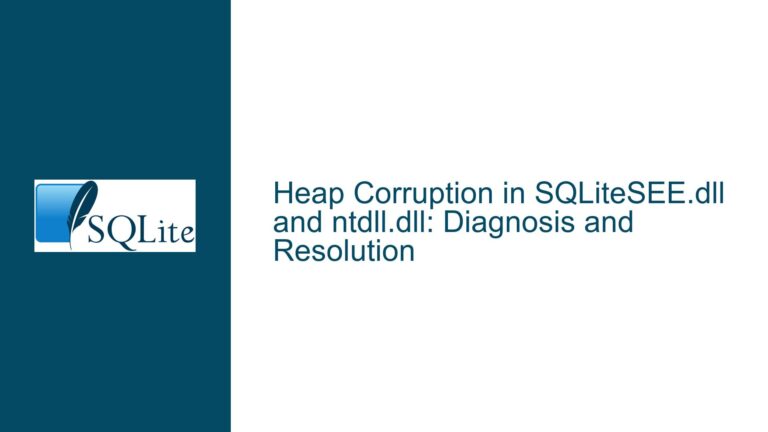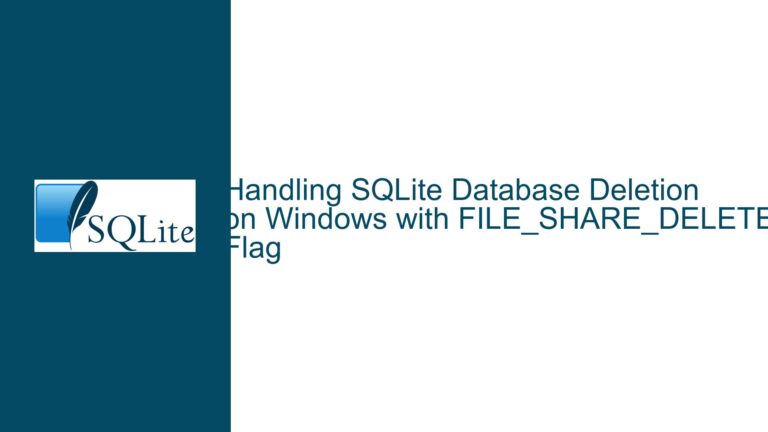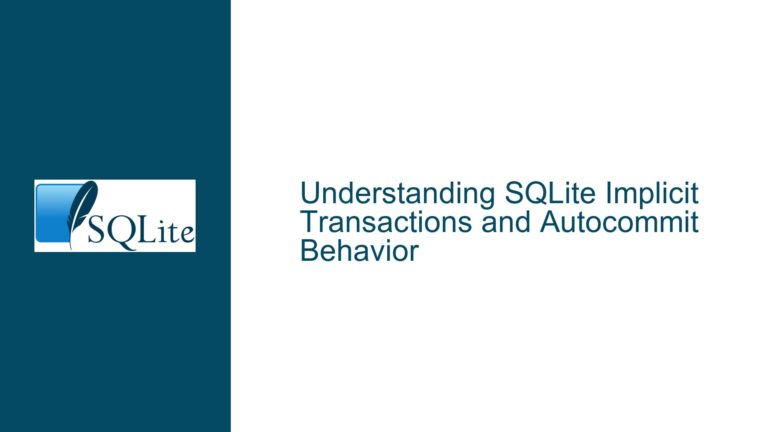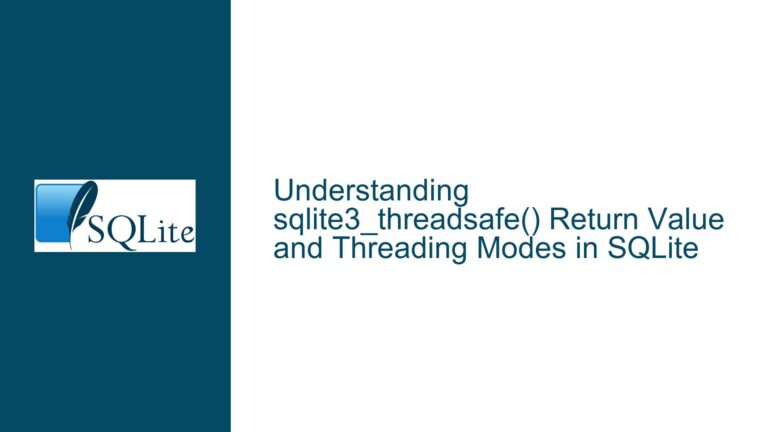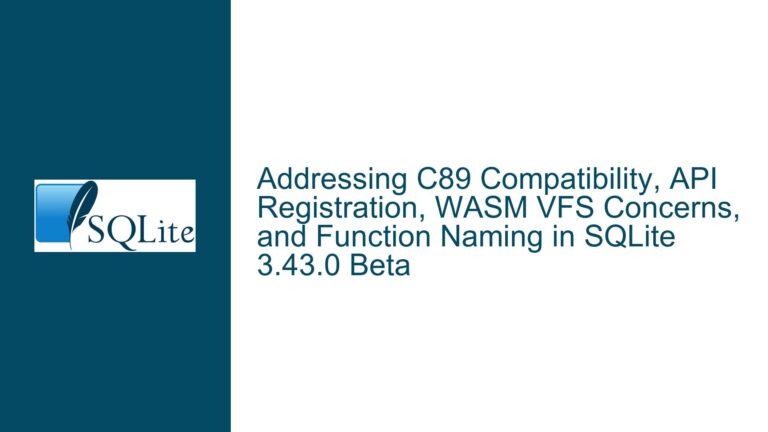Incorrect Line Endings in SQLite Shell.c on Windows Due to Git EOL Conversion
Mixed Line Endings in Shell.c Causing Debugging Issues on Windows
The core issue revolves around the SQLite shell.c file ending up with mixed line endings, specifically \r\r\n, when built on a Windows machine using Git for repository management. This anomaly causes debugging issues, as the line endings do not match the expected format, leading to mismatches in line numbers and breakpoints during debugging sessions. The problem is particularly pronounced when using Visual Studio for debugging, as the IDE expects consistent line endings to correctly map source code lines to executable instructions.
The shell.c file is a critical component of the SQLite amalgamation, responsible for providing the SQLite shell interface. When line endings are inconsistent, debugging becomes problematic because the debugger cannot accurately correlate the source code with the compiled binary. This issue is exacerbated on Windows, where the default line ending is \r\n (CRLF), as opposed to \n (LF) on Unix-based systems. The presence of \r\r\n suggests that an additional carriage return character is being introduced during the file generation or repository cloning process.
The root of the problem lies in the interaction between Git’s End-of-Line (EOL) conversion settings and the build process on Windows. Git’s core.autocrlf setting, when set to true, automatically converts LF line endings to CRLF on checkout and vice versa on commit. However, in this case, the conversion process appears to be malfunctioning, resulting in the insertion of extra carriage return characters. This behavior is not consistent with the expected behavior of Git’s EOL conversion, indicating a potential misconfiguration or bug in the Git client or repository setup.
Git EOL Conversion Misconfiguration Leading to Extra Carriage Returns
The primary cause of the mixed line endings in shell.c is the misconfiguration of Git’s EOL conversion settings, specifically the core.autocrlf parameter. When set to true, Git attempts to convert LF line endings to CRLF on Windows during the checkout process. However, in this scenario, the conversion process is introducing an extra carriage return character, resulting in \r\r\n line endings. This behavior is inconsistent with the expected outcome of Git’s EOL conversion and suggests a potential issue with the Git client or repository configuration.
Another contributing factor is the use of a Git mirror of the SQLite repository, as opposed to the official Fossil repository. While the GitHub mirror is considered official, it may not handle EOL conversions in the same way as the Fossil repository. Fossil, the version control system used by the SQLite project, does not perform automatic EOL conversions. Instead, it preserves the line endings as they are in the repository, which avoids the issue of mixed line endings. However, when using Git, the EOL conversion settings must be carefully managed to prevent issues like the one described.
The build environment also plays a role in this issue. The use of Visual Studio and the nmake build tool on Windows introduces additional complexity, as these tools may have their own expectations regarding line endings. The Makefile.msc used in the build process may not account for the possibility of mixed line endings, leading to inconsistencies in the generated shell.c file. Additionally, the use of a developer command prompt for Visual Studio may introduce environment-specific behaviors that affect the handling of line endings during the build process.
Resolving Mixed Line Endings by Adjusting Git Settings and Build Environment
To resolve the issue of mixed line endings in shell.c, the first step is to adjust Git’s EOL conversion settings. The core.autocrlf parameter should be set to input or false to prevent Git from automatically converting line endings. The input setting ensures that Git converts CRLF to LF on commit but does not perform any conversion on checkout, preserving the line endings as they are in the repository. The false setting disables EOL conversion entirely, which may be preferable if the repository is known to contain consistent line endings.
To apply these settings, the following commands can be used:
git config --global core.autocrlf input
or
git config --global core.autocrlf false
After adjusting the core.autocrlf setting, it is necessary to re-normalize the line endings in the repository. This can be achieved by removing the cached files and resetting the working directory:
git rm --cached -r .
git reset --hard
git checkout .
This process ensures that all files in the repository are re-checked out with the correct line endings, eliminating any inconsistencies introduced by previous EOL conversions.
In addition to adjusting Git settings, it is important to ensure that the build environment is configured to handle line endings correctly. When using Visual Studio, the project settings should be reviewed to ensure that the NMakeBuildCommandLine, NMakeCleanCommandLine, and NMakeReBuildCommandLine properties are correctly specified. The NMakePreprocessorDefinitions and NMakeIncludeSearchPath properties should also be verified to ensure that they do not introduce any unintended behaviors related to line endings.
If the issue persists, it may be necessary to manually normalize the line endings in the shell.c file using a tool like sed or a text editor that supports batch line ending conversion. The following sed command can be used to remove extra carriage return characters:
sed -e 's/\r\r/\r/' shell.c > shell.c.tmp && mv shell.c.tmp shell.c
This command replaces instances of \r\r with a single \r, effectively normalizing the line endings to the expected \r\n format on Windows.
Finally, it is worth considering the use of Fossil for managing the SQLite repository, especially if the project involves frequent debugging or development on Windows. Fossil’s handling of line endings is more straightforward, as it does not perform automatic EOL conversions. This eliminates the risk of mixed line endings and ensures that the source code remains consistent across different platforms. Additionally, Fossil provides a more integrated experience for SQLite development, as it is the version control system used by the SQLite project.
In conclusion, the issue of mixed line endings in shell.c on Windows is primarily caused by Git’s EOL conversion settings and can be resolved by adjusting these settings and normalizing the line endings in the repository. Careful management of the build environment and consideration of alternative version control systems like Fossil can further mitigate the risk of similar issues in the future. By following these steps, developers can ensure a consistent and reliable debugging experience when working with SQLite on Windows.


